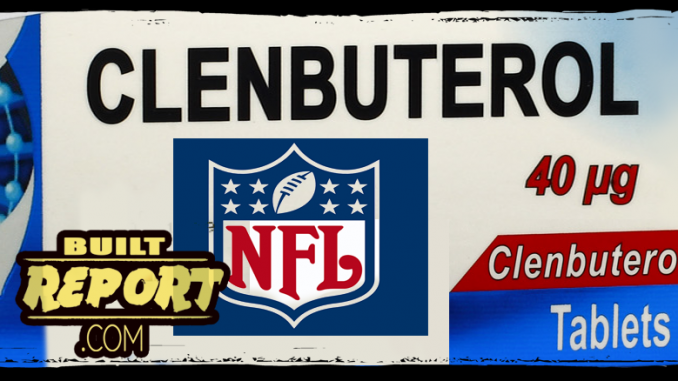
Jurassic Gorilla https://jurassicgorilla.com

NFL Issues Warning on Clenbuterol in Meat: Implications for Athletes and Consumer Safety
The National Football League (NFL) has recently issued a notable memo advising its players to exercise caution when it comes to consuming meat products from China or Mexico. The reason behind this cautionary note is the potential risk of testing positive for the banned substance Clenbuterol. This move comes in the wake of Houston Texans left tackle Duane Brown’s positive test for Clenbuterol, a situation that initially threatened his suspension from the league until his positive results were traced back to consuming beef during a trip to Mexico.
Clenbuterol, marketed under various brand names such as Dilaterol, Spiropent, and Ventipulmin, belongs to the category of sympathomimetic amines. It is primarily used to alleviate breathing disorders, acting as both a decongestant and a bronchodilator. For individuals suffering from chronic breathing issues like asthma, Clenbuterol serves as a bronchodilator that facilitates easier breathing.
Clenbuterol is most commonly available in the form of clenbuterol hydrochloride, which is the hydrochloride salt of the compound. Apart from its medicinal use, it has also been the subject of discussions and controversies in the world of sports and athletics.
Clenbuterol as a Performance-Enhancing Drug
Clenbuterol, owing to its properties as a β2 sympathomimetic, has found use as a performance-enhancing drug among athletes. The drug’s ability to act as a bronchodilator can enhance the flow of air into the lungs, potentially increasing an individual’s stamina and endurance.
The World Anti-Doping Agency (WADA) has classified Clenbuterol as a prohibited substance, and its use in professional sports is strictly banned. Its presence in an athlete’s system during drug testing can result in severe consequences, including suspensions and damage to the athlete’s career and reputation.
NFL Issues Warning on Clenbuterol in Meat: Implications for Athletes and Consumer Safety
Duane Brown’s case serves as a cautionary tale in the world of professional sports. The left tackle’s positive test for Clenbuterol sent shockwaves through the NFL. However, it was eventually determined that his ingestion of the banned substance was inadvertent and unintended. The root cause was traced back to the consumption of beef while visiting Mexico.
This case underscores the importance of understanding the potential risks associated with the meat supply chain, particularly when it comes to regions where Clenbuterol may be used in the livestock industry. In some countries, Clenbuterol is utilized as a growth promoter in livestock farming to increase muscle mass in animals. Consequently, residues of the substance can make their way into meat products, potentially posing a risk to consumers.
The NFL’s Proactive Approach
In light of Duane Brown’s case and the awareness of the Clenbuterol issue, the NFL has taken a proactive stance. The league issued a memo to its players, advising them to exercise caution and prudence when it comes to their dietary choices. By recommending that players avoid meat products from China and Mexico, where Clenbuterol contamination is more prevalent, the NFL aims to protect the integrity of the sport and its athletes while also safeguarding their health.
This approach serves as a reminder of the interconnectedness between sports, dietary choices, and the potential risks associated with consuming meat products from certain regions. Athletes, who are under rigorous testing protocols, are particularly vulnerable to unintentional Clenbuterol exposure due to their dietary requirements and the necessity for strict adherence to anti-doping regulations.
The NFL’s decision to issue this memo also reflects the league’s commitment to maintaining a level playing field and ensuring that athletes compete under fair and clean conditions. It’s a step toward raising awareness about the challenges of unintentional doping in sports and highlighting the importance of vigilance, particularly in a world where global supply chains can inadvertently expose individuals to banned substances.
Broader Implications for Consumer Safety
While the NFL’s memo primarily targets athletes, its message carries broader implications for consumer safety. The case of Clenbuterol-contaminated meat is not confined to the realm of professional sports; it’s a public health concern that affects consumers worldwide.
The incident underscores the need for robust food safety measures and regulations to prevent Clenbuterol contamination in the meat supply chain. It serves as a reminder that consumers must remain vigilant, especially when purchasing meat products from regions where the use of growth promoters like Clenbuterol is prevalent in the livestock industry.
In conclusion, the NFL’s cautionary memo about Clenbuterol in meat highlights the intersection of professional sports, dietary choices, and public health. While it aims to protect athletes from inadvertent doping, it also reminds consumers of the importance of food safety and the potential risks associated with their dietary choices. As the NFL and other sports organizations continue to prioritize anti-doping efforts, the issue of Clenbuterol-contaminated meat will remain a topic of concern, both in professional sports and on dining tables around the world.




Be the first to comment